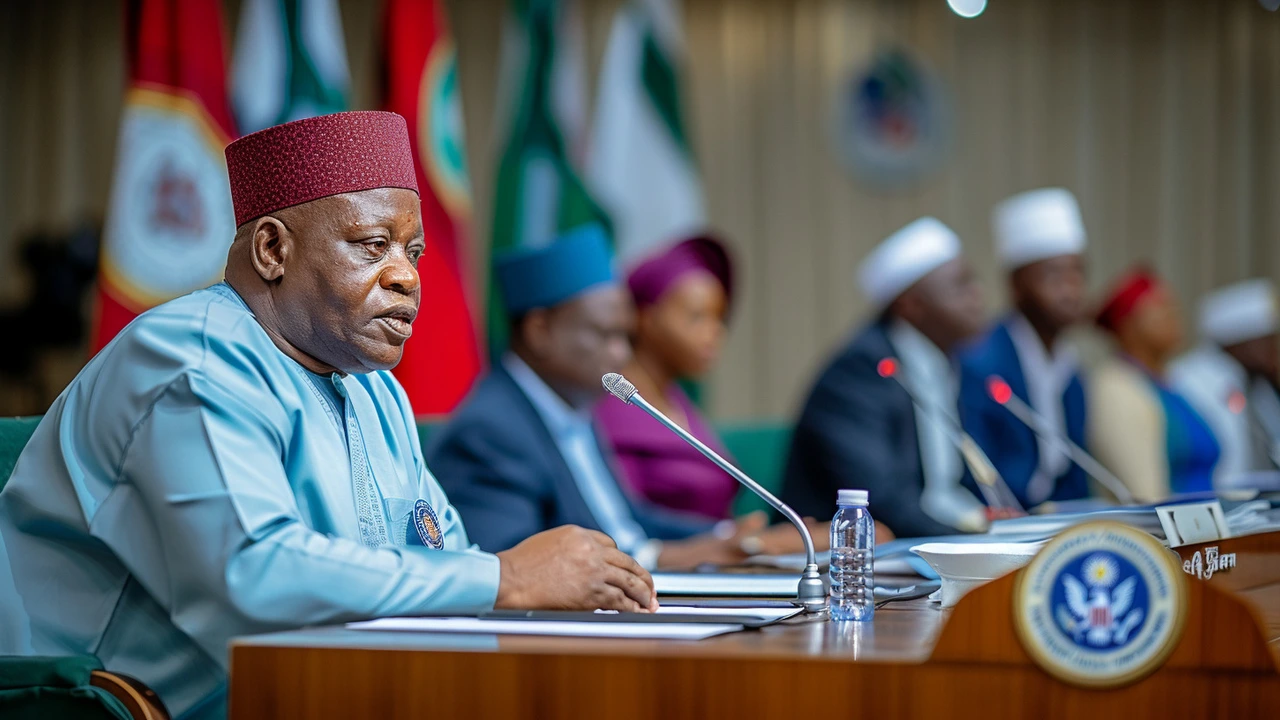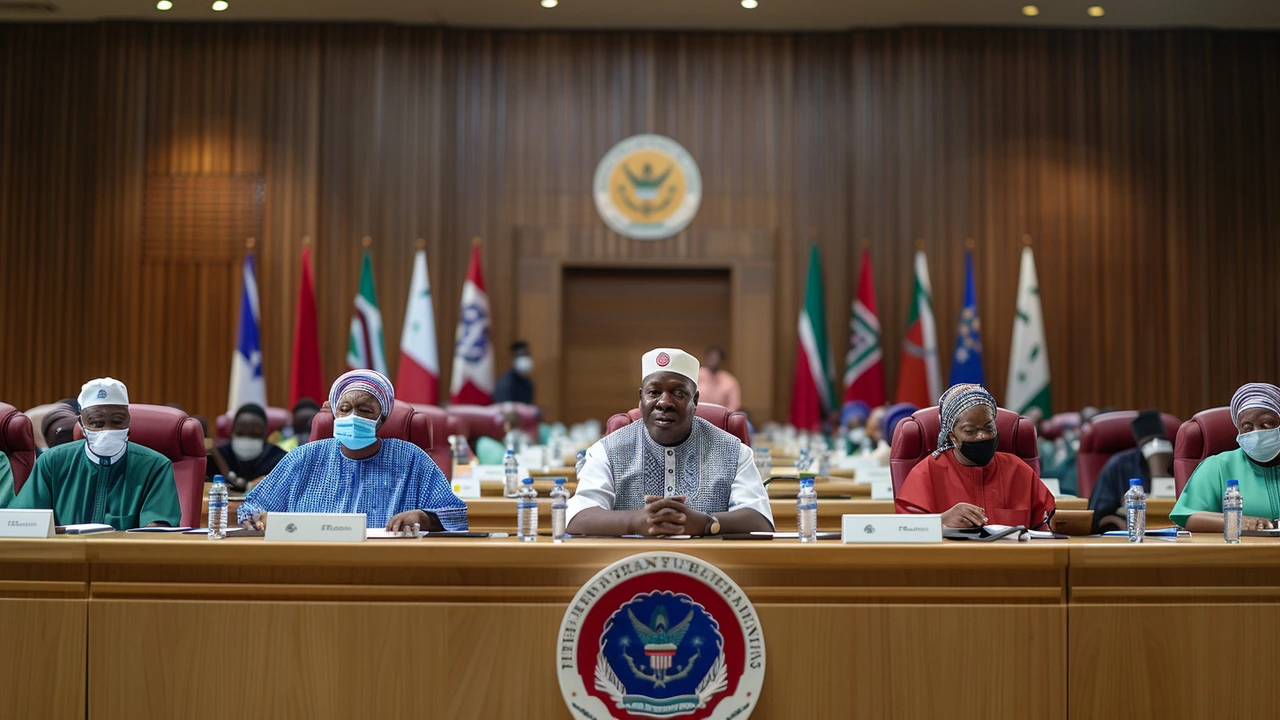Organised Labour Eager for President Tinubu’s Insights on New Minimum Wage Proposal
Organised labour unions across Nigeria are growing increasingly impatient as they await President Bola Tinubu's invitation to deliberate on the report from the tripartite Committee on a proposed new minimum wage. The urgency of these consultations stems from the need to formulate a comprehensive, just, and sustainable wage policy that would then be presented to the National Assembly for legislative endorsement.
In this period of anticipation, the Kogi State Government has set itself apart through its proactive stance on worker welfare. Demonstrating an unwavering commitment, the state has not only been diligent in paying salaries on time but has also ensured that pensioners receive their full entitlements. These actions underscore a dedication to enhancing the living standards of its workers, a gesture that has not gone unnoticed by labour unions and workers alike.
Proactive Measures by the Kogi State Government
The Kogi State Government's commitment extends beyond just timely salaries and pensions. In a bid to further bolster the welfare of its workforce, the state has introduced a 35% hazard allowance specifically for health workers. This move acknowledges the inherent risks these workers take, especially in the context of the global pandemic and other health crises. Such allowances are vital in not only boosting morale but also in ensuring that health workers remain dedicated and motivated in their service to the state.
Additionally, the state has made significant infrastructural improvements to support its workers. One notable example is the provision of a transformer and the subsequent connection of the state Nigeria Labour Congress (NLC) Secretariat to a 33KVA line. This upgrade is expected to provide a more reliable power supply, thereby enhancing the operational efficiency of the secretariat and ensuring that labour issues can be addressed more promptly and effectively.
The Role of Onah Edoka and Improved Industrial Relations
Onah Edoka, the former Chairman of the Nigeria Labour Congress in Kogi State, has been a pivotal figure in these developments. Now serving as a Special Adviser to the Governor on Labour Matters, Edoka has leveraged his extensive experience and networks to bridge the gap between workers and the government. His role underscores the importance of having knowledgeable and empathetic individuals in key advisory positions, particularly when it comes to labour matters. Edoka's involvement has been instrumental in facilitating smoother negotiations and fostering a more collaborative relationship between workers and the state government.
Joe Ajaero, the President of the Nigeria Labour Congress, has also expressed his appreciation for the improved industrial relations in Kogi State. Ajaero has assured the state of continuous support from the NLC, highlighting the importance of maintaining the current momentum. Nevertheless, he also issued a word of caution against any potential derailment of the progress that has been achieved thus far. His comments serve as a reminder of the delicate balance that must be maintained in labour relations to ensure sustained and equitable development.

Awaiting Presidential Action
The tripartite Committee on minimum wage, comprising representatives from government, labour, and the private sector, has completed its report and is now keenly awaiting President Tinubu's input. This committee's work is critical as it forms the foundation for the subsequent bill that will be presented to the National Assembly. The President’s perspectives and recommendations are crucial in shaping a wage policy that is fair and reflects the economic realities of the country.
The anticipation surrounding President Tinubu’s response is palpable. Labour unions and workers across Nigeria are hopeful that the President will prioritize their welfare and offer a favourable stance on the proposed minimum wage. This decision has far-reaching implications, not only for the immediate financial well-being of workers but also for the broader economic health of the nation. A fair and well-structured minimum wage policy can serve as a catalyst for economic growth, increased productivity, and improved living standards for millions of Nigerians.
Importance of an Equitable Minimum Wage
The concept of a minimum wage is rooted in the principle of ensuring that workers receive a basic standard of living through their earnings. It is a critical tool in combating poverty and reducing income inequality. In the Nigerian context, where a significant portion of the population lives below the poverty line, the establishment of a fair minimum wage is even more crucial. It has the potential to lift many out of poverty, provide economic stability, and spur consumer spending, which in turn can drive economic growth.
However, implementing a new minimum wage is not without its challenges. It requires a delicate balance between the interests of workers, employers, and the government. Employers, especially in the private sector, may face increased operational costs, which could affect profitability and lead to potential job losses if not managed carefully. The government, on its part, must ensure that the wage policy is sustainable and does not lead to unsustainable fiscal deficits.
A well-negotiated minimum wage that takes into account the economic realities and the pressing needs of workers can help mitigate these challenges. It is essential for the tripartite Committee and the President to engage in thorough consultations and analyses to arrive at a wage policy that is both fair and sustainable.
Moreover, the role of technological advancements and the changing nature of work must also be considered in these discussions. The gig economy, remote work, and automation are transforming traditional employment models, and wage policies must adapt to these changes to remain relevant and effective.
In conclusion, as organised labour and workers in Nigeria eagerly await President Tinubu’s response, there is a collective hope that a fair and sustainable minimum wage will be established. The proactive measures taken by the Kogi State Government serve as a positive example of government-labour cooperation that prioritises worker welfare. The journey towards a new minimum wage is a critical step in ensuring that workers across Nigeria can achieve a decent standard of living, and the decisions made in the coming days will have lasting impacts on the nation’s economic and social landscape.

13 Responses
Reading about Kogi’s proactive steps feels like a breath of fresh air in a landscape often clouded by stagnation. The 35% hazard allowance for health workers is not just a number; it’s a powerful acknowledgment of the sacrifices on the frontlines. Timely salaries and reliable power for the NLC secretariat exemplify what collaborative governance can achieve when empathy drives policy. Labour unions deserve a swift response from President Tinubu so that this momentum can be replicated nationwide. Let’s hope the dialogue translates into tangible gains for every Nigerian worker.
The recent developments in Kogi State demonstrate a structured approach to labour welfare, aligning fiscal responsibility with social equity. Timely remuneration and the introduction of a hazard allowance reflect measured policy interventions. It will be essential for the tripartite Committee to present a data‑driven report to the President for informed deliberation. A balanced outcome could set a precedent for other states.
The proposal for a revised minimum wage in Nigeria is a matter of profound socioeconomic significance.
Empirical evidence suggests that a calibrated increase can stimulate aggregate demand without precipitating inflationary spirals.
The Kogi State example provides a micro‑cosm of effective state‑level labour policy implementation.
Timely salary disbursement curtails the informal borrowing practices that erode household financial stability.
The 35 % hazard allowance for health workers duly acknowledges occupational risk, a factor often omitted in macro‑economic models.
Moreover, the infrastructural upgrade to the NLC secretariat's power supply enhances administrative efficiency, a requisite for policy execution.
The tripartite Committee’s report must therefore integrate quantitative assessments of wage elasticity, cost‑of‑living indices, and sectoral profitability margins.
President Tinubu’s engagement should be predicated upon a rigorous review of these metrics, rather than populist rhetoric.
A hasty endorsement without analytical grounding could exacerbate unemployment rates, particularly within labor‑intensive industries.
Conversely, an inadequately modest adjustment may fail to lift workers above the poverty line, undermining the policy’s intended redistributive effect.
Stakeholder consensus-encompassing labour unions, employer federations, and civil society-remains indispensable for durable implementation.
Historical precedents in comparable economies reveal that collaborative negotiation mitigates the risk of industrial unrest.
Accordingly, the President’s response should articulate a clear timeline for legislative drafting, parliamentary debate, and subsequent enforcement mechanisms.
Transparency in this process will bolster public confidence and deter speculative market reactions.
In sum, a meticulously calibrated minimum wage, informed by the Kogi precedent and robust economic analysis, stands to advance both social justice and national productivity.
One might marvel at the audacity of proclaiming Kogi State a paragon of labour harmony, as if other jurisdictions have languished in perpetual neglect. Yet the factual record-punctual salary payments, a hazard allowance, even a modest electrical upgrade-does not merely embellish rhetoric; it substantiates a concrete shift in governance philosophy. It is, however, a stretch to insinuate that such isolated initiatives will automatically remedy the nation‑wide wage conundrum without a systemic overhaul. While commendable, these measures should be contextualized within a broader framework of fiscal prudence and macro‑economic stability. Let us, therefore, await President Tinubu’s substantive policy articulation rather than celebrate isolated successes.
Yo, did you see Kogi’s “miracle” moves? Bet there’s some hidden agenda, like they’re trying to set a trap for the federal govt or something. Who knows, maybe they’re just testing the waters before a bigger plot unfolds.
Great to see Kogi leading by example – hope the federal response matches this momentum.
In the theater of policy, each act whispers the future's echo.
Wow!!! 🎉 Kogi's initiatives are seriously impressive!!! 🌟 Timely pay, hazard pay, power upgrades – it's like a labor dream come true!!! 🙌 Let's keep the energy high and hope the President picks up this positive vibe!!! 🚀💪
Oh, sure, a "structured approach" is exactly what we need-because the Nigerian economy has never needed any bold moves, right? A few spreadsheets and polite meetings will magically solve deep‑rooted wage disparities. Maybe next they'll suggest a coffee break to boost productivity.
Enough with the nonsense, you’re just spouting paranoid drivel that does nothing but distract from real progress!
Honestly, if more states took a page out of Kogi’s playbook, we’d see a ripple effect that could lift morale across the board. The synergy between government and workers there is a refreshing change of pace.
Totally feel you, Traci! The hype is real, but let’s stay grounded and push for concrete policy steps instead of just emojis.
In summation, the Kogi paradigm epitomizes a synergistic labour‑government nexus, catalyzing a paradigm shift toward equitable wage scaffolding. By operationalizing hazard allowances and infrastructural fortification, the state has instantiated a micro‑policy engine that can be scaled nation‑wide. Stakeholders must now co‑create a robust legislative framework, leveraging data‑driven analytics and participatory governance, to cement a sustainable minimum wage that elevates socioeconomic mobility. Let’s harness this momentum and transform aspirational discourse into actionable outcomes for every Nigerian worker.